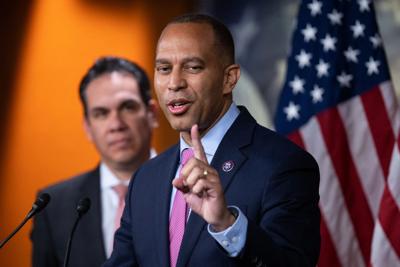Democratic lawmakers want to raise the federal minimum wage to $17 per hour, and a St. Louis advocate spoke last week during a press conference in Washington D.C. in support of the effort.
Frances Holmes, an employee at Busch Stadium, said that she can no longer afford her house because her compensation hasn’t kept up with increased rent prices and utility costs.
“It’s really not good for me,” Holmes said.
“What I’m proposing is that everyone in Congress, everyone in the Senate pass the Raise the Wage bill.”
While she is not a federal employee, Holmes campaigned for the passage of Proposition B in Missouri. Approved by voters in November 2018, Proposition B increased the state minimum wage by 85 cents per hour each year until 2023.
In a 2021 MSNBC interview while stumping for a $15 federal minimum wage, Congresswoman Cori Bush said, “in Missouri, we've seen progressive issues pass, but not necessarily very many progressive politicians.”
House Minority Leader Hakeem Jeffries, who backs the bill, said that Democrats were committed to getting an increased minimum wage enshrined into law.
“We want to make clear that greed is not good,” said Jeffries, invoking the infamous line delivered by Michael Douglas’s Gordon Gekko in the 1987 film “Wall Street.” “We believe in an economy that works for everyday Americans, not an economy for the wealthy, the well-off and well-connected.”
U.S. Rep. Bobby Scott (D-VA), the ranking member of the House Committee on Education and the Workforce, and Sen. Bernie Sanders (I-VT), the chair of the Senate Committee on Health, Education, Labor, and Pensions, have introduced the Raise the Wage Act of 2023.
The legislation would gradually increase the minimum wage to $17 an hour by 2028.
Scott and Sanders said it would provide about 28 million Americans with a long-overdue raise.
“No person working full-time in America should be living in poverty,” Scott stated. “Raising the minimum wage is good for workers, good for business, and good for the economy. When we put money in the pockets of American workers, they will spend that money in their communities.”
Republican members of Congress have repeatedly stifled efforts to raise the minimum wage, with many claiming it would harm businesses, even causing some to close.
“The $7.25 an hour federal minimum wage is a starvation wage. It must be raised to a living wage—at least $17 an hour,” Sanders insisted.
“In the year 2023, a job should lift you out of poverty, not keep you in it. At a time of massive income and wealth inequality and record-breaking corporate profits, we can no longer tolerate millions of workers being unable to feed their families because they are working for totally inadequate wages.”
Republicans hold super majorities in both the state House and Senate in Missouri, yet voters decided in 2014 that a state minimum wage of $7.65 was far too low.
The Democrats and the legislation’s 146 co-sponsors said that after more than a decade with no increase in the federal minimum wage—the most prolonged period in U.S. history—millions of workers are working full-time jobs but are still struggling to make ends meet.
They noted that one in eight workers in the United States earns wages that leave them in poverty, even when working full-time and year-round.
“And there is now no place in America where a full-time worker making the federal minimum wage can afford to cover the rent for a modest two-bedroom apartment,” Scott asserted.
“The Raise the Wage Act is good for workers, businesses, and the economy,” he continued.
“When we put money in workers’ pockets, they will spend that money at local businesses. The Raise the Wage Act will ensure that everyone can share in a stronger economy.”
The lawmakers noted that the Raise the Wage Act of 2023 would:
• Gradually raise the federal minimum wage from $7.25 to $17 by 2028;
Index future increases in the federal minimum wage to median wage growth to ensure the value of minimum wage does not once again erode over time;
• Guarantee that tipped workers are paid at least the full federal minimum wage by phasing out the subminimum wage for tipped workers, which will ensure decent, consistent pay without eliminating tips;
• Guarantee that teen workers are paid at least the full federal minimum wage by phasing out the rarely used subminimum wage for youth workers;
• End subminimum wage certificates for workers with disabilities to provide opportunities for workers with disabilities to be competitively employed and participate more fully in their communities.

















(0) comments
Welcome to the discussion.
Log In
Keep it Clean. Please avoid obscene, vulgar, lewd, racist or sexually-oriented language.
PLEASE TURN OFF YOUR CAPS LOCK.
Don't Threaten. Threats of harming another person will not be tolerated.
Be Truthful. Don't knowingly lie about anyone or anything.
Be Nice. No racism, sexism or any sort of -ism that is degrading to another person.
Be Proactive. Use the 'Report' link on each comment to let us know of abusive posts.
Share with Us. We'd love to hear eyewitness accounts, the history behind an article.